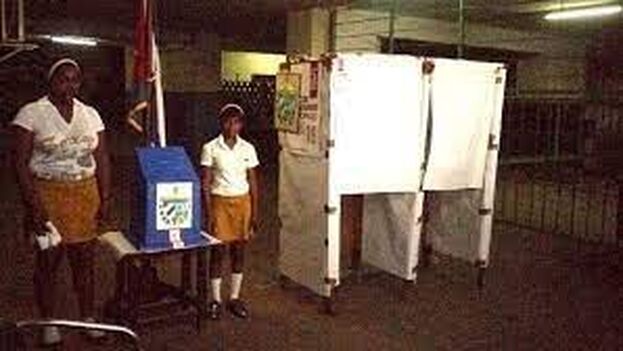
![]() 14ymedio, Madrid, 14 February 2023 — D Frente [D Front], an opposition group, born from an agreement among distinct organizations, is urging Cubans to abstain from the next elections for delegates to the National Assembly of the People’s Power on March 26th. In a statement issued on Tuesday, they invite citizens to participate in a campaign they are calling “Your abstention is your voice,” which consists of sharing on social media “one reason” for which they will abstain from participating in the election.
14ymedio, Madrid, 14 February 2023 — D Frente [D Front], an opposition group, born from an agreement among distinct organizations, is urging Cubans to abstain from the next elections for delegates to the National Assembly of the People’s Power on March 26th. In a statement issued on Tuesday, they invite citizens to participate in a campaign they are calling “Your abstention is your voice,” which consists of sharing on social media “one reason” for which they will abstain from participating in the election.
For D Frente, data from the last two elections, the referendum on the Family Code and the municipal elections in September and November 2022, respectively, in which abstentions reached record numbers, provided evidence of a “pretty clear trend” in the current political system: the “accelerated loss” of representative capacity. “It does not represent their own followers, because these cannot select from among a plurality of their supposed representatives, and they do not collectively represent society because it cannot freely select from among alternatives truly present in the country,” they state.
For this reason, they say that on March 26, 2023 “this new reality” will be verified: the divorce of “the official representative model” and “the real country.”
“When, of the 8 million voters, 3 million cannot find channels for representation, the problem lies with the system,” states the group, which highlights that the 470 delegates that will be selected on that day do so as a result of a proposal of “organizations registered in the State’s organigram.”
D Frente says that the electoral process, which began on January 30th, began by “violating the election law at least twice,” by “failing to publish the voter census and with a full-fledged electoral campaign.”
This, they continue, is an indication of “two deep realities”: on the one hand, emigration, which is assumed to be 3% of the Island’s electorate though the government “avoids exposing and verifying” that, and on the other hand, the obligation the regime has to “fight, through every possible public media outlet, for the participation at the polls of every single Cuban voter,” given the “progressive rupture of the so-called revolutionary consensus.”
Faced with these data, the organization demands with urgency “a new political contract for Cuba that will express its new plural, social and generational dynamic.”
For that, they propose that the “strategic roadmap” pass through “a constitutional reform that would institutionalize popular sovereignty as a cornerstone principle that would establish the rule of law without ideologies and where the Communist Party would no longer be the sole party,” as a first step toward “democratic, free, multi-party, just and inclusive” elections.
In addition to participating in the “Your abstention is your voice” campaign, D Frente suggests that Cubans request a certification of their voter status from the Electoral Council in each municipality, one step, they explain, “that is legally necessary for those who have supported or would like to support with their signature the diverse legislative and constitutional initiatives promoted by organizations that make up our group.”
In Madrid, exiled playwright Yunior García Aguilera, a member of D Frente, speaking for himself, told 14ymedio that establishing abstention is the right thing to do and that the campaign for a rejection vote must double down, but warned that the regime has thousands of ways to ensure those 470 delegates will ultimately be elected.”
For example, in contrast to the municipal elections, “now anyone could vote in any polling location,” which “could lend itself to them inflating the numbers and they could present results that are better than the previous elections.” This is how, in some municipalities, they aim to achieve 90% or 95% participation.
The artist and opponent does not believe that level will be reached, but he does believe they “can surpass the last estimate, from the municipal elections.” In any case, he says, it won’t make a difference, given that delegates only need 50% plus one vote to be elected.
“The only remote way for a candidate not to be elected is for people in that location to agree to vote for another candidate and that isn’t going to happen,” he says, but insists in the symbolic value of the abstention. “If we exceed the number from previous elections it would be a resounding response to the regime, although it will not change the results at all.”
Translated by: Silvia Suárez
____________
COLLABORATE WITH OUR WORK: The 14ymedio team is committed to practicing serious journalism that reflects Cuba’s reality in all its depth. Thank you for joining us on this long journey. We invite you to continue supporting us by becoming a member of 14ymedio now. Together we can continue transforming journalism in Cuba.
